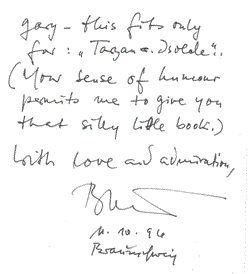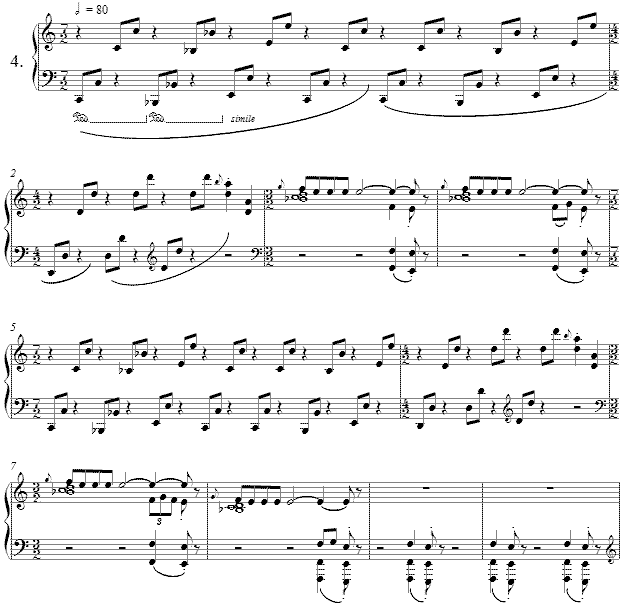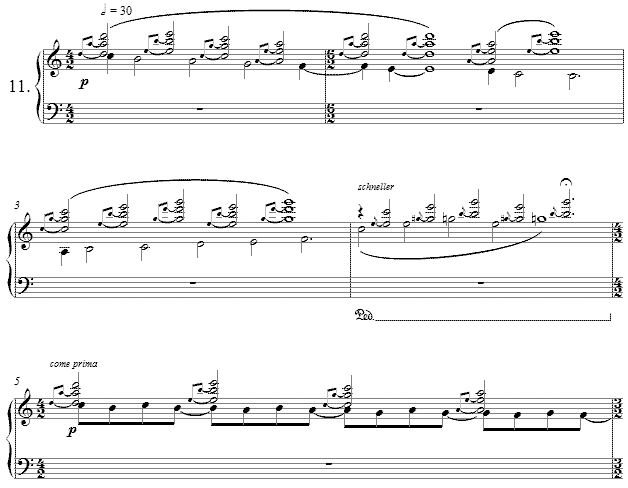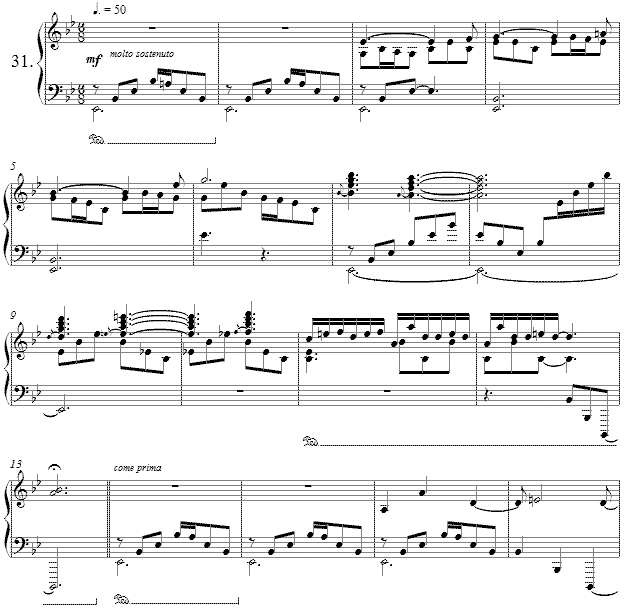Music and Texts of GARY BACHLUND
Vocal Music | Piano | Organ | Chamber Music | Orchestral | Articles and Commentary | Poems and Stories | Miscellany | FAQs
Postkarten-Galerie - (1996)
Thirty-nine etudes for piano
for Brigitte Fassbaender
1. Präludium
2. Adam und Eva
3. Devotion
4. Cherchez la femme
5. Behütet
6. Arbeitslose am Strand
7. Maulaffen
8. Des Menschen beste Freund
9. Wimbeldon 85..
10. Memory
11. Strasse im Regen
12. Dorfanger
13. Zwei Einwohner der Salisbury Cathedral
14. Regenwolken
15. Teufel Eins
16. Teufel Zwei
17. Das Holzbein
18. Bunkerwine
19. Alter Indianer vor den Fordwerken-USA
20. Berggeist
21. Berggasse 19/Wien IX
22. Hoffnungsloser Fall
23. Die Füttering
24. Grosses trauriges Tier
25. Allegorie vor geblümter Tapete
26. Das Schosstier der Familie
27. Mr. Birdseye, der Erfinder der Fischtäbchen
28. Der unfolgsame Igel
29. Haarscharf
30. Spätes Mädchen
31. Badefreuden
32. Bettscene
33. Bayerischer Schüler
34. Ludwig II
35. Das Auge des Gesetzes
36. So nicht meine Herren!
37. Heimatlos
38. Emigrant
39. Die Stadien der Trauer
[ 49 pages, circa 42' 40" ]
Brigitte Fassbaender
Born in Berlin, Germany, in 1939 - Brigitte Fassbaender, is the daughter of screen actress Sabine Peters and baritone, Willi Domgraf-Fassbaender. Her first love was not music, but theatre. Her father, head of the opera department at the Nuremberg Conservatory, took his daughter as a pupil, and she studied at the conservatory as a mezzo-soprano from 1959 to 1961, becoming a member of the Bayerischen Staatsoper in 1961. In 1971 she was named Kammersängerin. Working internationally as well, she was guest with the Metropolitan Opera, Covent Garden, London, La Scala, and a regular in the Salzburger Festspiel and Bayreuther Festspiel seasons, well renown for her roles including Oktavian in Der Rosenkavalier, Brangäne in Tristan und Isolde, and Carmen of Georges Bizet, Clairon in Capriccio, the Composer in Ariadne auf Naxos, Fricka in Die Walküre, Orlovsky in Die Fledermaus, Amneris in Aïda, Maddalena in Rigoletto, Eboli in Don Carlos, and Klytemnestra in Strauss’ Elektra.
In 1987 Fassbaender won a Gramophone Award for her Deutsche Gramophon disc of songs by Franz Liszt and Richard Strauss, and has also recorded Schubert’s Winterreise, Brahms’ Die Schöne Magelone and Carl Loewe’s little-known Fraünliebe. Today, she teaches ocal music at the Musikhochschule in Munich and is a fellow of Manchester’s Royal College of Music. She is also a passionate sketcher and painter, and after directing in Coburg, she served as Opera Direktor (1995–1997) for Theater Braunschweig. Since 1999 until recently she had been the Intendant of the Tiroler Landestheater.
This Postkarten-Galerie is an interpretation of a book of postcard-sized sketches, published together, which she gave to me during our work together in Braunschweig, each title reflecting something of the visual art, for which I imagined a musical version thereof.
The etudes range from thirty seconds in length to the final summation, which includes a reprise of the prelude, of 5' 25". The prelude begins essentially a static invention for two-voices, blurred by the sostenuto pedal.
Another etude is a set of broken octaves.
Among the many textures -- a valse triste and other triple meters, as well as jazz-oriented "licks" -- one is a blurred set of arpeggios and parallel chords.
As Brigitte was well known as a Wagnerian singer, there are some quotes from Wagner as well as hidden references to other operas for which her work was world renown. Below is a short parody of the long E-flat chord which opens Das Rheingold, reflecting her postcard titled Badefreuden.
51 pages, circa 44' 00" - an MP3 demo is here:
The score for Postkarten-Galerie is available as a free PDF download, though any major commercial performance or recording of the work is prohibited without prior arrangement with the composer. Click on the graphic below for this piano-vocal score.





